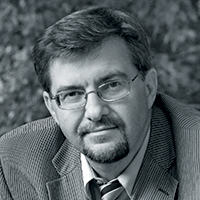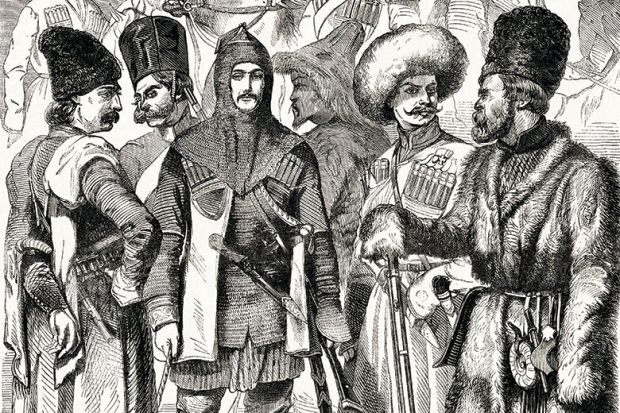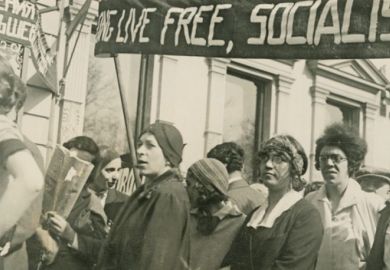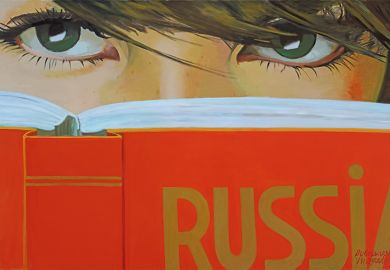Lost Kingdom is a tale of two Vladimirs, a 10th-century prince and a 21st-century president. On 4 November 2016, Vladimir Putin unveiled a statue close to the Kremlin of his namesake, Prince Vladimir the Great. The erection of this 17-metre monument to the medieval ruler of Kievan Rus had huge political implications, particularly while the conflict between Russia and Ukraine was rumbling on.
In 988, Vladimir the Great embraced Christianity for his domain, which incorporated much of modern-day Belarus, Ukraine and European Russia. Putin praised him as the “gatherer and protector of the Russian lands” who laid the foundations of a strong, united, centralised state, resulting in “the union of one great family of equal peoples, languages, cultures, and religions”. Kievan Rus later disintegrated, but modern-day Ukraine and Russia both consider Prince Vladimir to be their founding father. Those “gathered lands and peoples” are the eponymous “Lost Kingdom” of this book, a lively and impassioned rejoinder to Putin’s claim. Indeed, Serhii Plokhy’s work, in which he illuminates the importance of the Slavic “western provinces” to Russian national identity, is as much manifesto as monograph.
Hence this book is no dry academic exercise but one closely linked to the current geopolitical climate, the new Cold War: relations between East and West soured from spring 2014 when Russia claimed the Ukrainian peninsula as its territory, ignoring international outrage. If we want to understand what is going on, argues Plokhy, we need to look at Russia’s relations with Ukraine in the context of the longer sweep of history and try to understand the difference between national borders and national identity in Russia’s eyes.
The British historian Geoffrey Hosking first got to the crux of this problem when he wrote that “Britain had an Empire. Russia was an Empire”. He went on to argue that the demands of imperial expansion and the related state-building had impeded the formation of a sense of either ethnic or civic nationhood in Russia. Plokhy’s work builds upon this seminal insight to suggest that Russia’s eternal desire for a closer relationship with its fellow Slavic states continues to impede the creation of a modern, civic sense of nationhood. Russia cannot imagine itself without Ukraine, but Ukraine fails to reciprocate these fraternal longings…
It is no coincidence, of course, that such an exciting and provocative history of Russian nationalism and imperialism should come from a scholar whose specialism is primarily Ukrainian history. Rather than detracting from his study, this makes it deeply satisfying, since the hegemonic Russian version of events is challenged and the “Empire” strikes back.
The book spans five centuries of Russia’s attempts to restore the territorial unity of the “Lost Kingdom”. From the 1470s, when Ivan III pushed back the last of the Mongol horde, the principles of “Orthodoxy, autocracy and nationality” became crucial to the legitimacy of the Russian crown and what Plokhy terms “the invention of Russia”. From then on, Russian and Soviet expansion into the western borderlands was consistently presented in terms of the reunification of medieval Kievan Rus. This was true all the way from Catherine the Great’s partition of Poland as the reunification of the East Slavic lands to Joseph Stalin’s sending the Red Army into central Poland after the Nazi-Soviet Pact in 1939 to protect their “blood relatives, Ukrainians and Belarusians residing in Poland”. Putin’s statue is merely the most recent iteration.
Although the book’s subtitle promises “a history of Russian nationalism”, the focus remains tightly on Ukraine, with some consideration of Belarus, and Polish and Lithuanian lands. A fully rounded history of the relationship between Russian imperialism and nationalism would surely take into account the wider multinational, multi-ethnic, multi-confessional nature of the state beyond the East Slavs. Imperial conquest by Russian rulers was not focused solely on the neighbouring territories to the west, but encompassed vast territories and diverse peoples to the north, south and east who were continuously incorporated into the Russian Empire until the end of the Romanov dynasty, and reincorporated by the Soviet government in the 20th century.
This lucid and well-paced book builds to a dramatic crescendo in the final chapter, where Plokhy turns his attention to current affairs and offers solutions for solving the dilemma of Russian national identity. “Is Russia to become a modern nation-state,” he asks, “or will it remain a truncated empire, driven into ever new conflicts by the phantom pains of lost territories and past glories?” He argues that “Russia will not find security or prosperity through territory or ideology”, and proposes instead, perhaps rather optimistically, that it must “adjust [its] identity to the demands of the post-imperial world. The future of the Russian nation and its relations with its neighbors lies not in a return to the lost paradise of the imagined East Slavic unity of the medieval Kyivan state, but in the formation of a modern civic nation within the borders of the Russian Federation.”
From a historian’s point of view, however, it is surely too simple to hope that Russia can “forget” its past and emerge, a tabula rasa, into civic nationhood, with all the trappings of civil society and liberties, participation and representation which that entails. Certainly, an international environment of perceived threat and hostility can only inhibit the development of “civic” values that many inside and outside Russia hope to see mature, but that seem as far away as ever.
Yet there seems more to Russia’s invasion of Crimea than the business-as-usual posturing of an inherently expansionist aggressor. For three decades, Russia has experienced a serious crisis that left it vulnerable internally and externally. Following the disintegration of the Soviet Union in 1991, parts of the state broke away and serious conflicts erupted within Russia. Her foray into Western-style democracy and capitalism in the early 1990s ended disastrously. While the Warsaw Pact dissolved, Nato not only survived but expanded eastwards into the former Soviet Baltic republics, only to announce that it was preparing to invite Ukraine and Georgia to join as well. It also launched military operations without UN authorisation, first in Serbia and then in Iraq.
It is not too much of a stretch of the imagination to understand how these acts might have been regarded by Russia as a threat. In 2014, in reaction to what was perceived as a Western-backed coup in Ukraine, Russia occupied Crimea, Ukrainian territory that is home to the Russian Black Sea fleet. It seemed that international law and institutions could not guarantee security, and therefore Russia fell back into the 19th-century practice of great power rivalry.
With Russian “aggression” continuing to excite politicians, the media and the popular imagination in the West, this book is a must-read for anyone wishing to get to grips with the Russo-Ukrainian War. Still, it provides no definitive answer to the question of Russian national identity. The problem for Plokhy, as for all who try to marshal history as ammunition for contemporary conflicts, is that history is almost always interpretation – and, in Plokhy’s case, interpretation of interpretation. In the study of history, the evolving present casts the past in a new light, whether the revisionist is Ivan the Great, Putin or Plokhy himself. All in all, this is a masterful, provocative work by a scholar at the height of his powers which greatly enriches the centuries-long conversation on Russian identity. It will help specialists and general readers alike to understand the country’s tortuous relationship with its Slavic neighbours.
Lara Douds is assistant professor in 20th-century Russian history at Durham University and author of Inside Lenin’s Government: Power, Ideology and Practice in the Early Soviet State (2018).
Lost Kingdom: A History of Russian Nationalism from Ivan the Great to Vladimir Putin
By Serhii Plokhy
Allen Lane, 432pp, £20.00
ISBN 9780241255575
Published 10 October 2017

The author
Serhii Plokhy, Mykhailo Hrushevsky professor of Ukrainian history at Harvard University, was born in Russia but grew up in Ukraine. He did his undergraduate studies in the city of Dnipropetrovsk – in an institution that, he says, was “founded in 1918 by the short-lived Ukrainian government of Pavlo Skoropadsky, but in all Soviet-era publications the official date of the foundation of the university was moved by a few months to claim that it was really founded by the Soviets”. Like many others in the last decades of the Soviet Union, he became deeply interested in “the ‘true’ story of [his] homeland”.
Based in North America since 1996 and at Harvard since 2007, Plokhy is the author of The Origins of the Slavic Nations: Premodern Identities in Russia, Ukraine, and Belarus (2006), in which he focused on “medieval and early modern times. Lost Kingdom brings the story all the way into the 21st century.”
Recent developments in Russia, he argues, have seen “a process of recovery of the pre-revolutionary, imperial past, its symbols and ideas. One of those imperial models is…of the big Russian nation…consisting of Russians, Ukrainians and Belarusians. It was all but forgotten after the Revolution of 1917 but came back during the Russian war in Ukraine in Vladimir Putin’s pronouncements about Russians and Ukrainians being one and the same people.”
Plokhy acknowledges that US “undergrads as a rule know little about the subject before they get in my classroom…It is a great pleasure to see how much more knowledgeable and sophisticated they become about this or that particular part of the region’s history. When it comes to writing, you have to explain to the American audience why they should care about the subject you yourself are so interested in. It is a challenge, but that also helps you figure out what is most important in your own work.”
Matthew Reisz
POSTSCRIPT:
Print headline: Searching for a national identity
Register to continue
Why register?
- Registration is free and only takes a moment
- Once registered, you can read 3 articles a month
- Sign up for our newsletter
Subscribe
Or subscribe for unlimited access to:
- Unlimited access to news, views, insights & reviews
- Digital editions
- Digital access to THE’s university and college rankings analysis
Already registered or a current subscriber?








